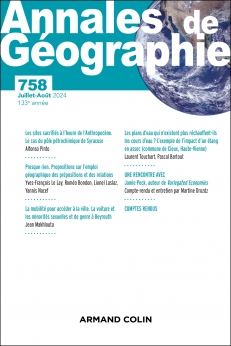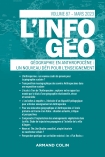
ANNALES DE GÉOGRAPHIE N°758 (4/2024)
Pour acheter ce numéro, contactez-nous
Recevez les numéros de l'année en cours et accédez à l'intégralité des articles en ligne.
Cet article souhaite contribuer à la stabilisation de la notion de zone (ou site) sacrifiée d’un point de vue environnemental. Née et développée dans le contexte des études sur l’environmental justice aux États-Unis, cette notion désigne des territoires, à la taille variable, subissant, ou ayant subi, des dégradations environnementales dues à des activités telles que l’industrie, l’extraction ou la gestion de déchets dangereux. Après un état des lieux synthétique sur les différents travaux qui ont traité, directement ou indirectement, la question du sacrifice environnemental, le texte propose de l’appliquer dans le contexte euroméditerranéen à travers l’analyse d’un cas d’étude précis : le pôle pétrochimique de Syracuse (Italie). À partir de 1949, ce territoire est devenu l’un des principaux sites pétrochimiques européens. Pourtant, l’absence de planification, les failles dans les législations sur la protection de la santé et de l’environnement ont donné lieu à une véritable urgence sur le plan sanitaire et environnemental. Ce cas d’étude témoigne non seulement de la pertinence de la notion de sacrifice environnemental dans un contexte non américain, mais permet aussi de saisir les potentialités transversales d’une notion clé pour mieux réfléchir aux rapports entre sociétés et environnement dans le contexte de l’Anthropocène.
This paper tries to contribute to the stabilization of the notion of sacrifice zone from an environmental point of view. Born and developed in the context of studies on environmental justice, this notion is used discontinuously, particularly in the United States where it designates territories, of varying size, undergoing, or having suffered, environmental degradation due to activities such as industry, extraction, or hazardous waste. After having carried out a synthetic inventory of the various works which have dealt, directly or indirectly, with the question of environmental sacrifice, the text will seek to propose its application in the Euro-Mediterranean context through the analysis of a specific case study: the petrochemical site of Syracuse (Italy). From 1949 this territory became one of the main European petrochemical sites. However, the absence of planning, the loopholes in the legislation on the protection of health and the environment and a very questionable economic and political management, have given rise to a real emergency on the health and environmental level. This case study not only testifies to the relevance of environmental sacrifice in a non-American context, but also allows us to grasp the cross-cutting potential of a key notion to better reflect on the relationship between societies and the environment in the context of the Anthropocene.

